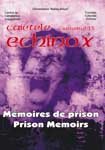Memorialising Totalitarian Terror: The ‘Overcoded Fictions’ of East-Central Europe
Memorialising Totalitarian Terror: The ‘Overcoded Fictions’ of East-Central Europe
Author(s): Cristina-Eva SandruSubject(s): Literary Texts
Published by: Universitatea Babeş-Bolyai
Keywords: Communism; East and Central Europe; ”overcoded fiction”; Raymond Aron; Hannah Arendt; Czeslaw Milosz; Slavoj Žižek.
Summary/Abstract: One of the most complex phenomena characteristic of the totalitarian age in the countries of East-Central Europe was the interpenetration of complicity and resistance that made possible the survival of critical consciousness and intellectual life in the very teeth of a fiercely inflexible ideology. This article examines the various literary responses to the widespread political and psychological terror dominating East-Central Europe in the years immediately following the imposition of communist rule in 1945. Charting a diverse intellectual territory, the essay examines the metamorphoses of terror methodologies as discussed by theorists and writers as diverse as Raymond Aron, Hannah Arendt, Czeslaw Milosz and Slavoj Žižek, and the mechanisms of resistance that they have engendered, particularly as documented in literary texts and testimonials. The discussions will range from the literatures of documentary realism to the distinct but interrelated types of what I have termed ‘overcoded fiction’ – i.e. writings whose gravitational centre rests on the significant silences and implicit statements that inhabit their visible textual surface. These can be dystopian or magical realist in character, or, more often than not, mock-comedic and parodic; they testify not only to the desire to memorialize, but also the need to forge meaningful connections with a ‘normality’ that had been forcibly corroded by vicious suppression and institutionalized censorship.
Journal: Caietele Echinox
- Issue Year: 2008
- Issue No: 15
- Page Range: 161-176
- Page Count: 16
- Language: English
- Content File-PDF

